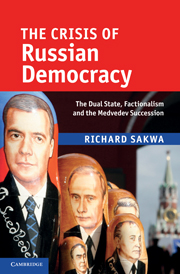Book contents
- Frontmatter
- Contents
- List of tables
- Preface
- Acknowledgements
- Note on transliteration
- 1 The dual state in Russia
- 2 Succession struggles and electoral contests
- 3 Political power and factionalism
- 4 A genuinely political economy
- 5 Managed succession
- 6 War of the Putin succession
- 7 Duma selection
- 8 Presidential succession
- 9 Medvedev's challenge
- 10 Conclusion: transcending the dual state
- Bibliography
- Index
4 - A genuinely political economy
Published online by Cambridge University Press: 05 June 2012
- Frontmatter
- Contents
- List of tables
- Preface
- Acknowledgements
- Note on transliteration
- 1 The dual state in Russia
- 2 Succession struggles and electoral contests
- 3 Political power and factionalism
- 4 A genuinely political economy
- 5 Managed succession
- 6 War of the Putin succession
- 7 Duma selection
- 8 Presidential succession
- 9 Medvedev's challenge
- 10 Conclusion: transcending the dual state
- Bibliography
- Index
Summary
Each of the main groups identified above reflect a facet of Putin's political personality and his contradictory representation of the power and modernisation challenges facing the country. Looked at another way, these factions (notably the security establishment and the liberal economists) represented real domestic constituencies to which the leadership had to respond, and the balancing strategy proved to be an effective way of managing them, even though the price was the political stalemate inherent in the passive revolution. It is quite possible that a future leader will shift from balancing to confrontation, and while this would open up a clear path in one direction or another, the disruptive effect would be high as the Caeserist strategy was implemented. Putin instead remained above faction, but all of the factions had a stake in Putin's presidency and in turn his leadership was embroiled in each of the factions. Each embodied an element of the programmatic orientations of his presidency, but in the end his presidency was less Bonapartist than hegemonic; not standing above factions but constantly acting as the faction manager to ensure that the balance within the regime was not disrupted. At certain times and over certain issues, a faction or alliance of factions would be stronger and, commensurately, their opponents eclipsed. For example, while the attack on Yukos was led by the siloviki, the democratic statists, concerned with the defence of the prerogatives of the state, joined in to provide ideological justification, and even certain liberals such as Kudrin, concerned about fiscal recovery, endorsed the assault.
- Type
- Chapter
- Information
- The Crisis of Russian DemocracyThe Dual State, Factionalism and the Medvedev Succession, pp. 131 - 159Publisher: Cambridge University PressPrint publication year: 2010



